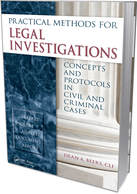
In Dean’s book, ‘Practical Methods for Legal Investigations: Concepts and Protocols in Civil and Criminal Cases’ – (www.PracticalMethodsForLegalInvestigations.com) the process of legal investigation, including conducting these types of investigations, is Prepare, Inquire, Analyze, Document, and Report.
In the last two months we shared some insight into the first two steps of Dean’s developed professional investigative protocol – Prepare and Inquire – at www.DeathCaseReview.com/afi-llc-blog. This month we will talk about the natural transition to Analyze.
The Analyze stage of this Investigative protocol follows a series of important organizational planning steps. It is where the rubber meets the road - the investigation and case gain traction. The legal investigator has gathered information and determined the factual evidence versus the information provided only in the disclosure and discovery; and processes of law enforcement, government, and business or insurance investigators. This Analyze stage is both a subjective and objective reasoning exercise completed within each assignment, then assignment to assignment or task to task – scene to scene and witness to witness, and so forth until the case is completed. For this reason, it is important to organize the investigation into these individual assignments and stages.
These stages are typically immediate, interim or intermediate, and long-term goals and needs. This is primarily based upon factors outside of the legal investigator's control: legal calendaring requirements, availability of records and reports, and the priority and availability of witnesses, and so forth. As noted in the Prepare stage, prioritizing is an important part of the investigative preparation. Key components to prioritize are: evidence and discovery or disclosure analysis, incident investigation and documentation, and key witness interviews. These are generally always the first and short-term priorities of the initial stages of the investigation. After this is completed, in the Inquire stage, an analysis must be done. The legal investigator will look at the totality of the evidence as an assessment. First is the analysis of the provided records and reports. Then will be the analysis of the Inquire information – your investigation to date. Finally, will be the comparison of the two packets of information - ultimately determining what is factual, possible or plausible, and what is partially to wholly fiction.
The legal investigator has invested a significant amount of time, funds, and resources working the case just through the Prepare and Inquire stages. This Analyze stage is not as fundamentally consuming of resources; it is however, equally important. This is particularly true of the two areas of investigative findings to be analyzed: provided information and information developed in this Investigative Protocol. The analysis is not as time intensive as this Investigative Protocol and processes to date. This is because the training, education, and experience of the legal investigator provide for this. Legal investigators have two important skills: to be inquisitive and analytical. They work with and complement each other. As with transitioning from Prepare to Inquire, the transition from Inquire to Analyze is natural for the seasoned legal investigator. This transition may be during the Inquire stage, depending on the assignment, or it may be a completely separate function. An analysis at the scene of a motor vehicle collision may be concurrent with that inquiry, and particularly before leaving; it may also be two-part, with further in-depth analysis usually done at a later time.
Analysis of each stage involves: a complete comparison of the information; determination of any missing, conflicting, supporting, and damaging information; assessment of the strengths and weaknesses of the information, facts, and evidence; additional assessment of the strengths and weaknesses of the witnesses, parties of the case and other involved persons; assessment of the strengths and weaknesses of the investigative process to date; and a complete assessment and analysis of the case progress to determine any new, continued, or different course of action to recommend and consider.
This is also the time to determine if there is any follow-up to any assignments that were addressed during this assignment of the investigation. In short, the legal investigator is providing a check and balance to ensure that no evidence is being forced upon a theory, or that no theory is being forced upon the evidence. This is true of all information provided and developed in this Investigative Protocol, without regard for who is providing the evidence. This process will continue throughout the assignment and the overall case, until the case is settled, dismissed, or other disposition reached.


